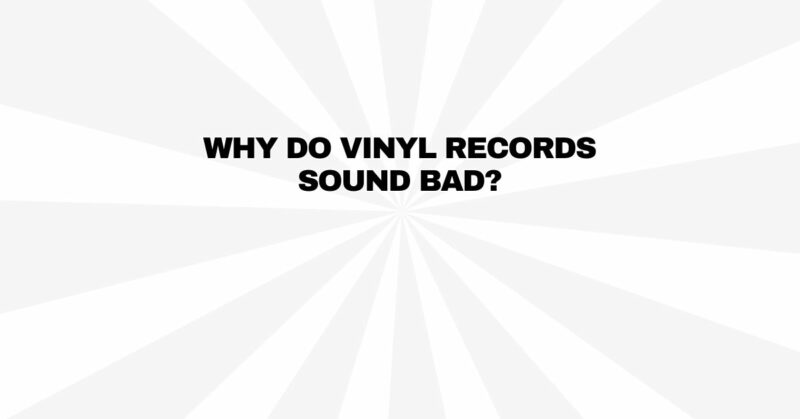Vinyl records are often praised for their analog warmth, rich character, and unique listening experience. However, it’s not uncommon to hear some individuals describe vinyl records as sounding “bad” or “inferior” compared to digital audio formats. This perception is subjective and can be influenced by several factors. In this article, we’ll explore some of the reasons why vinyl records may be perceived as sounding less than optimal and address whether these criticisms are justified.
1. Surface Noise and Imperfections:
One of the most common criticisms of vinyl records is the presence of surface noise, pops, clicks, and other imperfections. These artifacts can be caused by dust, scratches, and wear on the record’s surface. Surface noise, in particular, can be distracting and detract from the listening experience, leading some to perceive vinyl as sounding “bad.”
2. Wear and Tear:
Vinyl records are physical media that can degrade over time with repeated play. As the stylus makes contact with the grooves, it can cause wear, resulting in a gradual loss of audio fidelity. If a record is not well-maintained or stored improperly, it can develop significant wear, affecting its sound quality.
3. Playback Equipment:
The quality of the playback equipment, including the turntable, cartridge, and phono preamplifier, can significantly impact the sound quality of vinyl records. Low-quality or poorly calibrated equipment can introduce distortions and inaccuracies, leading to a subpar listening experience.
4. Mastering and Pressing Quality:
Vinyl records are created from master tapes, and the quality of these master recordings, as well as the pressing quality of the vinyl itself, can vary. A poorly mastered or pressed record can exhibit sonic issues such as excessive surface noise, distortion, or imbalances between the stereo channels.
5. Tracking and Alignment:
Improper tracking force and cartridge alignment can cause tracking errors, where the stylus does not follow the groove accurately. This can result in distorted or mistracked audio, making the record sound less than optimal.
6. Limited Frequency Response:
Vinyl records have a limited frequency response compared to digital formats like CDs. High-frequency content may be attenuated, and extreme low frequencies can cause tracking problems. This limitation can lead some to perceive vinyl as lacking in fidelity, especially when compared to high-resolution digital formats.
7. Inconsistent Pressings:
The quality of vinyl pressings can vary widely, even for the same album. Different pressings from different manufacturers or time periods may sound different due to variations in mastering, pressing techniques, and vinyl quality.
8. Personal Preference:
Ultimately, the preference for vinyl records or any audio format is highly subjective. Some listeners may prefer the unique character and analog warmth of vinyl, while others may favor the clinical accuracy and convenience of digital formats.
Addressing Perceived Issues:
While some listeners may indeed find vinyl records to have limitations, it’s important to note that many of these issues can be mitigated with proper care, maintenance, and the use of high-quality equipment. Regular cleaning of records, careful handling, and investing in a well-calibrated turntable setup can significantly improve the vinyl listening experience.
Additionally, advancements in vinyl mastering and pressing techniques have led to the production of high-quality records with improved sound fidelity. Audiophile-grade vinyl releases, audiophile pressings, and remastered editions can offer superior audio quality for those seeking the best possible vinyl experience.
In conclusion, the perception that vinyl records sound “bad” is subjective and influenced by various factors, including playback equipment, maintenance, mastering, and pressing quality. While vinyl records may have limitations and imperfections, they also offer a unique and cherished listening experience appreciated by many audiophiles and music enthusiasts. Ultimately, the perceived sound quality of vinyl records is a matter of personal preference, and some may find their analog warmth and character to be deeply satisfying and emotionally resonant.


